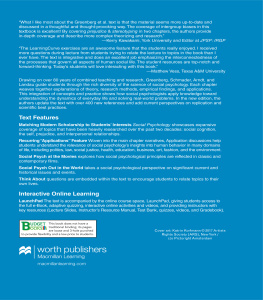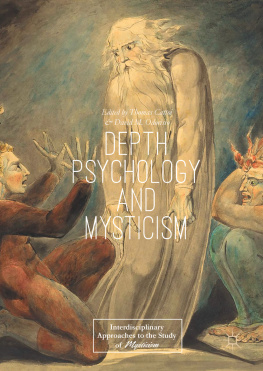Tomasz Witkowski
Shaping Psychology
Perspectives on Legacy, Controversy and the Future of the Field
1st ed. 2020
Tomasz Witkowski
Wroclaw, Poland
ISBN 978-3-030-50002-3 e-ISBN 978-3-030-50003-0
https://doi.org/10.1007/978-3-030-50003-0
The Editor(s) (if applicable) and The Author(s), under exclusive license to Springer Nature Switzerland AG 2020
This work is subject to copyright. All rights are solely and exclusively licensed by the Publisher, whether the whole or part of the material is concerned, specifically the rights of translation, reprinting, reuse of illustrations, recitation, broadcasting, reproduction on microfilms or in any other physical way, and transmission or information storage and retrieval, electronic adaptation, computer software, or by similar or dissimilar methodology now known or hereafter developed.
The use of general descriptive names, registered names, trademarks, service marks, etc. in this publication does not imply, even in the absence of a specific statement, that such names are exempt from the relevant protective laws and regulations and therefore free for general use.
The publisher, the authors and the editors are safe to assume that the advice and information in this book are believed to be true and accurate at the date of publication. Neither the publisher nor the authors or the editors give a warranty, expressed or implied, with respect to the material contained herein or for any errors or omissions that may have been made. The publisher remains neutral with regard to jurisdictional claims in published maps and institutional affiliations.
Cover illustration: agsandrew/gettyimages
This Palgrave Macmillan imprint is published by the registered company Springer Nature Switzerland AG
The registered company address is: Gewerbestrasse 11, 6330 Cham, Switzerland
Shaping Psychology is a collection of revealing and stimulating interviews of leading psychologists with research interests ranging from heuristic biases to behavioural genetics. Their careers are captured in entertaining vignettes preceding in-depth discussions of their scientific contributions and their views on such contemporary issues as reproducibility, open science, artificial intelligence and the relevance of psychological research for everyday life. Recommended for those concerned about where Psychology is going in the 21st century and for students hoping to tread that fascinating path.
Professor Trevor W. Robbins, University of Cambridge
A wonderful book, full of unexpected and insightful answers to probing questions. The full sweep of psychology and the mind sciences is in full display. A must read.
Professor Michael Gazzaniga, University of California, Santa Barbara
This is a wonderful book. The biographical sketches are fascinating, and the interviews provide insight and wisdom. I highly recommend it to students, psychologists, and the general public.
Professor Roddy Roediger, Washington University, St. Louis
Shaping Psychology is an engaging and often provocative volume filled with fascinating insights from prominent researchers whose work has strongly impacted the development of psychological science. Anyone interested in the past, present, or future of psychology should read this book immediately.
Professor Daniel L. Schacter, Harvard University
The book offers important insights from leaders in the field of psychology and constitutes a very useful and original contribution to the field.
Professor James Alcock, York University
I think the project could be an important time-capsule for future generations, offering a glimpse of the psychologists and the discipline as they are found in the early 21st century.
Professor Lisa Osbeck, University of West Georgia and Past-President of APA Division 1, Society for General Psychology (20202021)
Dedicated to the scientists who will perfect psychology with their bravery, knowledge, and resolve.
Contents
The Author(s) 2020
T. Witkowski Shaping Psychology https://doi.org/10.1007/978-3-030-50003-0_1
1. Introduction
Psychology is at present one of the most fashionable scholarly disciplines. In 2018, the American Psychological Association announced that psychology is more popular than it has ever been. It is estimated that between 1.2 and 1.6 million undergraduates take introductory psychology classes each year. According to the U.S. Bureau of Labor Statistics, overall employment for psychologists will grow by 19% between 2014 and 2024, much faster than the 7% average growth predicted for all occupations. Even the Catholic Church took notice of the fields growing popularity, quite some time ago. In his 1987 report on the state of the church, the future pope Cardinal Joseph Ratzinger expressed concerns that psychology posed a real threat to religion , that it was responsible for empty monasteries and had superseded theology (Ratzinger and Messori , pp. 99100).
Indeed, the popularity and spread of psychology is tremendous. Most illustrated magazines have advice columns edited by a psychologist to address concerns from readers. Many people have scheduled appointments with their psychologists or psychotherapists and spend a few hours every week in their offices. TV programs often feature experts (psychologists) explaining why somebody had killed, raped, defrauded money or committed suicide . Psychologists always show up after some major event to provide an interpretation of what happened. In most bookstores, shelves bend under the weight of volumes offering psychological support and advice. Celebrities usually discuss their psychological problems publicly and openly talk about therapeutic programs that they participated in. People socializing at gatherings exchange recommendations for psychotherapists. Psychologists often show up at crash sites or the epicenters of natural disasters. They work at schools, hospitals, hospices, social support sites and in the human resource departments of most corporations. They can be found in the police and in the army, but also in churches and prisons. Psychology truly is omnipresent.
At the same time, it is replete with controversies, flaws, uncertain claims and even myths. In recent years, the field of psychology has been rocked by numerous scandals, such as the participation of psychologists in developing methods for enhancing the interrogation of prisoners, the demasking of a tremendous scientific fraud , and multiple failures in the replication of famous experiments, primarily in social psychology . These stories have made their way onto the front pages of newspapers, and information about them has traveled well beyond the borders of the academic community. Psychology and its weaknesses are the subject of conversations everywhere, with opinions being given regardless of education and knowledge. Many authors are talking and writing about the crisis in psychology. It is not uncommon to encounter the radical opinion that psychology in general is not a science. These opinions crowd out the voices of the authorities and scientists who built its foundations. Many lay readers, students, but also psychology teachers feel lost in the flood of opinions. Despite the growing popularity of psychology, it appears to be evolving into a minefield. From time to time, one of the mines explodes, leading to a precipitous drop of societal trust in the discipline.













